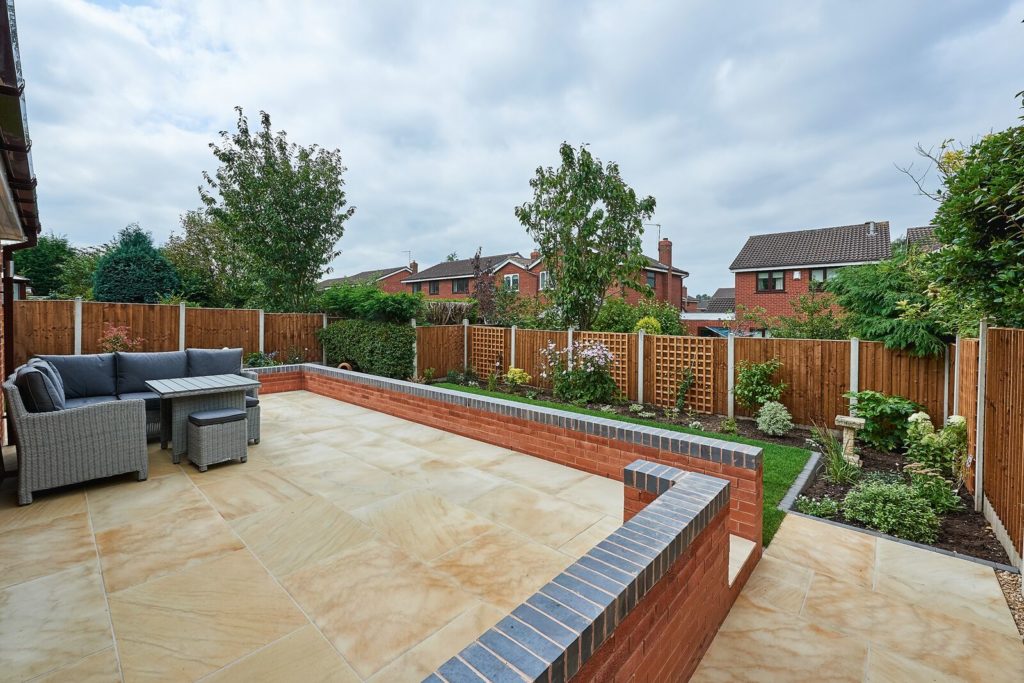We get asked frequently whether we recommend sealing natural stone. Unfortunately, we do not have a definitive answer because there is no right or wrong decision! This sealing guide will hopefully provide you will all the information you need, in order to make an informed decision.
The most important thing to remember about natural stone is that it is extremely hardwearing. Natural stone is a natural material that has been formed over millions of years, making it a product that will weather well. However, like all materials used externally the harsh weather during the winter months will make the paving dirtier, quicker, so we highly recommend that you sweep and clean it regularly.
We do not believe that you need to seal your paving, we know that just by cleaning your patio will help to keep on top of any dirts or marks, but we completely understand that some people do prefer to seal their paving.
Some people’s personal circumstances can effect their decision to seal their natural stone. For example if your garden is; North facing – the garden/patio area might be in shade more than south facing gardens, so algae will be more prone. Has increased traffic – children playing, ie football, riding bikes etc.. and pets with dirty paws Surrounded by mature and overhanging trees and plants – the garden can become covered in berries, sap, leaves and if birds sit in the trees, your patio can become prone to bird droppings!
Sealants
There are many different types of sealants available to buy. For example there are ones that just cover the surface of the paving slab or alternatively there are impregnating sealants, which soak into the paving slab itself.
Unfortunately, because we do not manufacture sealants ourselves, we are not best placed to advise on which type would be best, so we do recommend that you do your own research.
Think about why you want to seal your patio, is it to protect the paving or is it to create a particular look? There are different types of sealants which will create a permanent ‘wet look’ these are known as enhancing sealants. These types of sealants work well on natural stone where the blend of colours and veining will become more vibrant. For example EM Rainbow natural veining and colour are greatly enhanced using an enhanced sealant.
An invisible sealant acts as a barrier, this will not enhance the paving or effect the overall look of the paving. A sealant like this would work the same as fence paint on a wooden fence and staining for decking, the sealant is used purely to protect the paving.
Here is a list of Pro’s and Con’s of sealing your natural stone.
Sealing PRO
1) A sealant can help to provide an extra layer of protection.
2) Some people prefer to seal the lighter coloured natural stone, as this range of natural stone will show dirt and marks quicker. ie a bit like a cream carpet would.
3) Sealants can enhance various colour blends and veining within the slab.
Sealing CON
1) Always ensure that the area that is to be sealed, is completely dry and clean before any application of a sealing product is applied. If it is not cleaned loose debris or moisture will become trapped under the sealant and will affect the overall finished look.
2) Sealants are not lifelong. The sealant will need to be reapplied as sealants will weather like all products that are used externally.
3) Do shop around for a sealant, as sealants can work out expensive per m2.
4) Sealants will stop natural stone from ‘breathing’. (If the paving has been recently installed it is important that the paving is allowed to settle and adapt to its environment before a sealant is applied.)
5) If there are any installation issues after your paving has been laid, such as efflorescence, and the paving has been sealed, the efflorescence staining will become trapped under the sealant layer and it will be harder to remove.
6) Ensure that the weather is dry when sealing your paving. The warmer weather will help it dry quicker. A sealant can become ‘sticky’ if not dried properly which means that dirt and marks will become engrained in the sealant layer.
So, if you have decided to seal your paving, we highly recommend that you think about the following:
As well as using a SBR slurry when your paving is installed some people also prefer to seal their paving beforehand, this ensures that the whole paving slab can be covered and will act as an extra barrier against efflorescence staining.
Always try the sealant product on a small test area first. Do not cover the whole area/patio before you are completely happy with the overall finished look.
Always leave the test area after sealing the paving for at least a couple of days before you decide to cover the whole area. This will give you chance to check the overall finish and make sure it has worked the way you want it too.
THE PAVING EXPERT WEBSITE
The Paving Expert website is an independent website with more specific advice and guidance on sealing. We found the following articles on that website which cover all aspects of sealing.
http://www.pavingexpert.com/sealant_02.htm
http://www.pavingexpert.com/sealant_03.htm

